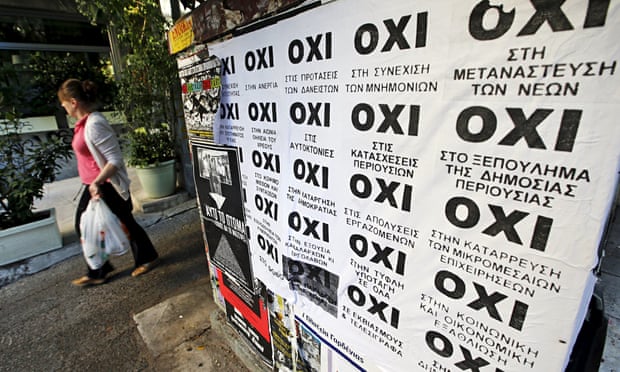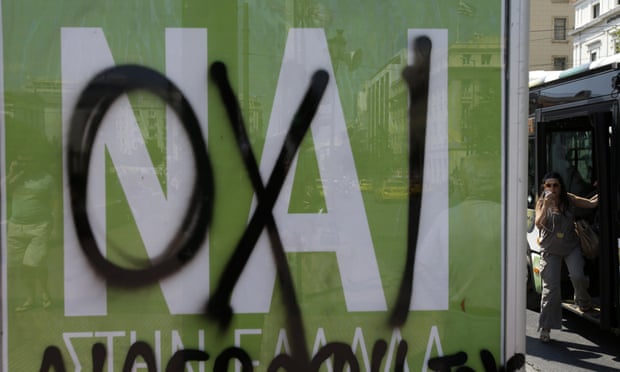Sunday, July 5, 2015
Greece: It's Ohi Day
Despite the polls, it wasn't even close. No has won 61-39%. I say and maintain that what we are seeing here looks very much like the run-up to a war. You have the failed negotiations, the increasing intransigence, the outraged nationalism, the (probably intentional) humiliating ultimatum and the irate refusal.
There may also be a true dog whistle going on here. By making his slogan Ohi! -- No! -- to a German ultimatum, Prime Minister Tsipras may be making a strong nationalist appeal with symbolism apparent to a Greek, but not to an American. (I can't say about other Europeans). To recap, in October, 1940 the Nazis had overrun Poland, France, the Low Countries, and seemed invincible. Mussolini, wanting in on the action, made demand on October 28, 1940 that Greece lay itself open to Italian troops. The Greek Prime Minister answered in French, "Alors, c’est la guerre.” "Then this is war." But the Greeks preferred to believe that he answered in Greek, "Ohi!" "No!" Greeks poured out into the street shouting "Ohi! Ohi!" to proclaim their support. War ensued, the Nazis behaved like Nazis, and Greece suffered more than the worst possible outcome anyone can contemplate here. Despite the horrors that followed, Greeks are proud of their defiance and celebrate every October 28 as Ohi Day, the day we said no. So making Ohi! one's slogan, parading signs saying Ohi! in the streets and calling on the Greeks to say Ohi! to this ultimatum are more potent appeals to nationalism than we may realize.
And they appear to have worked. Talk about the mysteries of the "Greek temperament" are futile here. And this does not contradict the foregoing paragraph. The symbols of nationalism and defiance differ from one country to the next, but underneath it all, human nature is the same. And it is human nature to dislike being bullied, humiliated or coerced and to respond with defiance -- often foolish and self-destructive defiance, but defiance nonetheless.
And make no mistake, what the Europeans were trying to do was bully, humiliate and coerce. They determined their offer and made clear that there was to be no negotiations, no concessions, no face-saving compromise that was really a capitulation in disguise. Capitulation must be open and acknowledged. This looked suspiciously like a move to depose the Syriza government and install one more to Europe's liking. Such a move would not be unprecedented, after all. Th EU has already deposed Silvio Berlusconi in Italy, although the Italians don't seem to have minded much. But Berlusconi was unpopular, scandal-plagued, and had overstayed his welcome. In the case of Greece, the EU was seeking to depose a leader duly elected less than six months earlier and replace him with someone more subservient. And they were shocked -- shocked -- that the people responded with anger. And now Europe and Germany are reacting with their own anger and shutdown.
Europeans ask why the Greeks were such fools as to think they had options when there was only one option all along -- submission. Well, not quite. Syriza proved quite wrong if they they thought there was a good option. But when you present and ultimatum, you are ultimately offering two options -- submit or be crushed. And looking over the history of warfare, an extraordinary number of nations in such a position have chosen "be crushed." Well, it is my belief that this whole showdown should be analyzed through the lens of war. In all probability, Ohi! means "Alors, c’est la Grexit.” How does "Alors, c’est la Grexit” compare to "Alors, c’est la guerre"?
We know that in old-style warfare, the early ravages of war -- bombed cities, invasions, soldiers coming home in body bags, etc. does not undermine a nation's resolve, but rather strengthens it. But we also know that morale and resolve don't survive famine. When food runs out, so to does the will to fight. On the other hand, sanctions that pinch but do not starve have proven to be most ineffective. They simply give the sanctioned government a scapegoat to blame for the country's misfortunes and rally against. In case of Grexit, Greece is apt to experience something worse than mere sanctions, but not as bad as true famine and blockade. And I wonder now as I did before how long a country's resolve can hold up under surging costs of imports, plummeting values of savings, surging foreign debts, widespread bankruptcy, economic crisis and all the other hardships that will attend a devaluation. We have the answer on at least one question. A nation's resolve can withstand a week of frozen bank accounts and limited withdrawals. But how much more?
Subscribe to:
Post Comments (Atom)



No comments:
Post a Comment